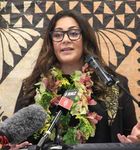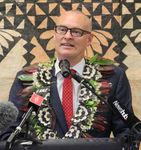Collaborations for Action - Le Va
←
→
Page content transcription
If your browser does not render page correctly, please read the page content below
Collaborations for Action
Le Va hosted the Growing Pasifika Solutions Satellite Seminar in collaboration with the
Drua Pasifika Addictions Network to share knowledge, innovative methods in effective
prevention and treatment intervention strategies. LAUMATA LAUANO spoke with
Epenesa Olo, the Ministry of Health’s Principal Advisor, Child & Youth Mental Health &
Addictions and Le Va’s chief executive Dr Monique Faleafa
THE MINISTRY OF HEALTH’S PRINCIPAL ADVISOR - CHILD & “What came through strongly was that our people and communities
Youth Mental Health & Addictions Epenesa Olo, who identifies herself want action. They don’t want a lovely plan that’s written down. They
as a Savaiian from the village of Fogasavaii, has a strong passion for and actually want to see some action.”
an extensive background in mental health and addictions. That step to action enables providers to access funding for services
As a registered Clinical Psychologist who has worked in infant, child, used by our people in the community. It includes training and
adolescent mental health, adult mental health, and addictions, along with development for the workforce behind these services. The GPS seminar
extensive work in the community, Epenesa is keenly aware of the high is important in bringing together service providers and the workforce
demand for mental health and addiction services, the workforce issues to absorb knowledge from each other to put plans into action.
in the specialist area and the inequities in outcomes for Māori and
Pasifika populations.
Providing advice for the implementation of a mental health and
addictions system that can be transformed to be fit for the future
brought her to the Ministry.
“Ala mo’ui, the Pacific Health Action Plan, is being redone and so there
were around 13-14 talanoa sessions with the sector and the community
around Aotearoa Niu Sila,” she says.
“This was a chance to hear from the community about what they
wanted and what’s important to them, because sometimes what’s
important to the ministry is not necessarily what our people see as
important.
Epenesa Olo
46 SPASIFIK MAGAZINE www.SPASIFIKmag.comAid to fight Addictions
Le Va’s national 2019 GPS conference in Auckland in September, partnered with the Drua Pasifika Addictions
Network, brought together Pasifika addiction workers to share knowledge, innovation, effective prevention
and treatment intervention strategies. INNES LOGAN speaks with Helen Schmidt, Clinical Team Leader
Community Alcohol and Drug Service South Auckland in Manukau Waitemata District Health Board
FOR HELEN SCHMIDT (FROM SAFOTU, IVA AND PAIA IN
Samoa), Le Va’s GPS conference provides a proven platform to
share innovative and integrated wellbeing solutions that address
the needs of Pasifika families.
As Clinical Team Leader Community Alcohol and Drug Service
South Auckland in Manukau Waitemata District Health Board,
she has seen the effects of addictions on Pacific youth grow. But
while Methamphetamines, also known as meth, blue, ice and
crystal among other terms, generate alarm as a highly addictive
stimulant that adversely affects the central nervous system, alcohol
dominates as the drug of choice which creates the most damage.
“Across all measurements of harm through drugs and alcohol
across society, alcohol is by far the most damaging with cannabis
second, due to the sheer numbers who have taken them,” says
Helen who, after studying a chemistry science degree, followed up relevant way which include consultation, assessment, individual
by studying psychology, zoology and psychiatry. counselling/talanoa and group support, which often occur after
Her actual lack of work experience in these fields proved a barrier hours.
until she applied for and was granted a teacher aid position at One after-hours event that brought the house down at the
Odyssey House in West Auckland, working as part of a youth Mangere Arts Centre – Nga Tohu Uenuku - was More Than Enough
day programme model for therapeutic communities. Despite the - a collaboration between the Black Friars and Mangere Catholic
challenges, Helen had her foot in the door and soon found her youth with support from Le Va and Drua.
niche.
“The creativity that came from such a space that our Pacific
“Initially, it was hard and challenging work being involved with kids community call part of their home was very emotional,” Helen
in that spectrum, because they weren’t equipped to go to the usual recalls.
schools,” she says.
“People opened up on all sorts of issues, like the impact of social
“Many of them are there because their families can’t manage them. media and social justice for youth in relation to how they’re judged
Youth can be very impulsive and demanding. But it’s why they’re and treated. They see the selling of land for housing which they
here and we’re here. Their families need support because their can’t afford anyway as hugely frustrating. But their sense of pride in
situations often seem overwhelming.” where they came from and where they are now, still holds strong.”
One of their saving graces comes from CADS – Community, In November 2020 the New Zealand cannabis referendum will
Alcohol and Drugs Services in Auckland. be held as part of next year’s General Election on the question of
It includes Tupu, a team of Pacific Island workers who support whether to legalise the personal use of cannabis.
Pacific people and their aiga/fanau/magafaoa who have alcohol and/ Helen hopes those Pacific youth that have a voice and an opinion
or other drugs and/or gambling issues, problems or questions. It on cannabis will utilise their democratic right by voting.
offers a range of free support services delivered in a culturally
“One of the things I see is that particular organisations have their “It’s important to us that they’ve got a voice and are in the game.”
strengths,” she says. Te Rau Hinengaro, the 2006 New Zealand Mental Health Survey, found
“Rather than competing against each other to provide services, if that Pasifika peoples have higher rates of alcohol abuse (5.3%) than
somebody is better at something, they can join with someone who is the general population, (3.5%), and that substance use is the third most
better at something else,” says Epenesa. commonly reported lifetime disorder for Pasifika adults.
“So, rather than an organisation trying to do everything, which we know While Pasifika peoples report higher incidents of violence and injury
we can’t, the benefit of having collaborations are important.” from other people’s drinking in general, the use of drug and alcohol
For Dr Monique Faleafa, the main thing is providing a platform for our services by Pasifika is very low, at 27% less than the national average.
Pasifika addiction workers to come together, but it’s also for the funders, Te Rau Hinengaro, the New Zealand Mental Health Survey, found that
so we can facilitate that conversation, particularly around the wellbeing Pasifika peoples have higher rates of alcohol abuse than the general
budget. population.
“It’s important our Pasifika people doing amazing things in our In addition, a study by Haukau et al identified: 57% of Pasifika peoples
addictions sector know how to apply for funding and can contribute to were drinkers (males 61%, females 51%), compared with 85% of the
the Ministry of Health Fono that’s happening. general Aotearoa/New Zealand population (males 88%, females 83%).
www.SPASIFIKmag.com SPASIFIK MAGAZINE 47PM Opens NZ’s first Suicide Prevention Office
Prime Minister Jacinda Ardern and Minister of Health Dr David Clark marked the opening of New Zealand’s first
ever Suicide Prevention Office on November 27 at the Ministry of Health office in Wellington. Le Va also hosted
the health minister at its Manukau office for further announcements in mental health investments
FOLLOWING WORK ALREADY UNDERWAY TO TACKLING
the nation’s persistently high rate of suicide the opening was
boosted by the launching of a $12.4 million community suicide
prevention fund for Māori and Pacific communities.
“Last year, 685 New Zealanders are believed to have taken their
lives through suicide. Each of those deaths was a tragedy and we
must do more to support people in distress, or struggling with
addiction,” said the Prime Minister.
“The new Suicide Prevention Office is a crucial part of the
Wellbeing Budget’s record investment in mental health and Health Minister David Clark Le Va CEO Monique Faleafa
addiction, which included $40 million on suicide prevention.”
Over the next four years the $12.4 million Māori and Pacific evidence-informed approach with local knowledge and experience,
suicide prevention community fund will be used to support Māori to provide suicide prevention programmes that are community
and Pacific providers to design and deliver culturally responsive focussed, clinically safe, and culturally responsive.
suicide prevention initiatives. As New Zealand’s national Pasifika “We know Māori and Pacific are over represented in suicide
suicide prevention lead, Le Va welcomes the announcement. statistics and we need to find and support new community
Le Va’s work combines an internationally proven, responses that will help change that,” said the PM.
Minister Clark says the Suicide Prevention Office will galvanise
PHOTO: RNZ / DOM THOMAS
PM Jacinda Ardern
work towards making New Zealand a better place for all to thrive.
“As well as our work in suicide prevention, we’re investing in new
frontline mental health and addiction services up and down New
Zealand,” he said.
“We want every New Zealander to know that when times get
tough, if they are in distress or they reach a crisis point, there is
someone they can turn to for help.”
The Suicide Prevention Office will initially be established as a
team within the Ministry of Health’s Mental Health and Addiction
Directorate, led by Director Carla na Nagara.
And while Pasifika peoples report higher incidents of violence and
injury from other people’s drinking in general, the use of drug and
alcohol services by Pasifika is very low, at 27% less than the national
average. Pacific youth (aged 15 to 19 years) appear to use these
services as frequently as any other New Zealand young people.
Monique says it’s also an issue of being under resourced which is being
addressed now.
“This investment provides us with the
opportunity to enhance the quality
of services so they are culturally safe
and relevant, increasing access and “We need our own people working with our own people. It would be
ensuring the best possible outcomes good to see a lot more focus on Pacific youth, because that’s where
mental illness and addictions start.”
for our Pasifika communities.”
The Addiction Seminar was a pre-conference event to the Addictions
“We’ve had quite a few years of being under resourced in the Pacific Cutting Edge GPS conference. Le Va’s national Growing Pasifika Solutions
addictions and mental health sector. MOH acknowledges that it’s bi-annual conferences have demonstrated to be an effective platform
exciting we’re finally being able to provide the quality and the culturally to showcase innovative and integrated solutions that meet the needs of
competent services and programmes that our Pacific communities our Pasifika families.
deserve,” she says.
“It’s not going to happen tomorrow, but maybe in five to 10 years to
For more information go to
build that capacity and capability to get that quality that we need.”
www.leva.co.nz
Monique wants to see more Pacific people working in mental health
and addictions, both as clinicians and community workers.
48 SPASIFIK MAGAZINE www.SPASIFIKmag.com“If we give full participation with radical acceptance and absolute
inclusion, we will unleash the full potential of our young people.”
GPS Pasifika Youth Action Komiti
This conference is for anyone whose work impacts on Pacific young people,
particularly across social sectors such as:
mental health justice & corrections education & training
suicide prevention health workforce sports & wellbeing
whanau ora addictions research & policy
violence prevention disability support services social services
GPS for our Young People aims to:
share effective & integrated solutions
facilitate insights & innovation. 6-8
April 2020
CHECK OUT VODAFONE EVENTS
the amazing line-up CENTRE MANUKAU
of inspirational speakers
AND REGISTER NOW TO AVOID DISAPPOINTMENT
www.gps2020.nz #gps2020
LV 191004
www.SPASIFIKmag.com SPASIFIK MAGAZINE 49You can also read
























































